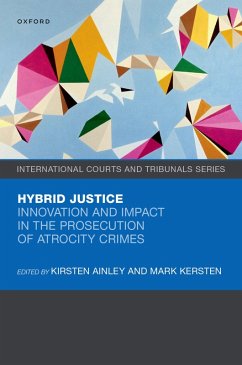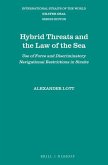Hybrid Justice
Innovation and Impact in the Prosecution of Atrocity Crimes
Herausgeber: Ainley, Kirsten; Kersten, Mark
Hybrid Justice
Innovation and Impact in the Prosecution of Atrocity Crimes
Herausgeber: Ainley, Kirsten; Kersten, Mark
- Gebundenes Buch
- Merkliste
- Auf die Merkliste
- Bewerten Bewerten
- Teilen
- Produkt teilen
- Produkterinnerung
- Produkterinnerung
Borne out of a collaboration between lawyers, academics, and activists, this edited volume provides a uniquely comparative account of the development of hybrid courts in recent years.
Andere Kunden interessierten sich auch für
![Hybrid Threats and Grey Zone Conflict Hybrid Threats and Grey Zone Conflict]() Hybrid Threats and Grey Zone Conflict220,99 €
Hybrid Threats and Grey Zone Conflict220,99 €![Hybrid Warfare Under International Law Hybrid Warfare Under International Law]() Stuart Casey-MaslenHybrid Warfare Under International Law104,99 €
Stuart Casey-MaslenHybrid Warfare Under International Law104,99 €![Maritime Security Law in Hybrid Warfare Maritime Security Law in Hybrid Warfare]() Maritime Security Law in Hybrid Warfare144,99 €
Maritime Security Law in Hybrid Warfare144,99 €![Hybrid Threats and the Law of the Sea Hybrid Threats and the Law of the Sea]() Alexander LottHybrid Threats and the Law of the Sea141,99 €
Alexander LottHybrid Threats and the Law of the Sea141,99 €![Spermatogenesis of Normal and of Hybrid Pigeons Spermatogenesis of Normal and of Hybrid Pigeons]() Michael Frederic GuyerSpermatogenesis of Normal and of Hybrid Pigeons28,99 €
Michael Frederic GuyerSpermatogenesis of Normal and of Hybrid Pigeons28,99 €![Victims and Criminal Justice Victims and Criminal Justice]() Pamela CoxVictims and Criminal Justice117,99 €
Pamela CoxVictims and Criminal Justice117,99 €![The Defence of Mistake of Law in International Criminal Law The Defence of Mistake of Law in International Criminal Law]() Antonio CocoThe Defence of Mistake of Law in International Criminal Law122,99 €
Antonio CocoThe Defence of Mistake of Law in International Criminal Law122,99 €-
-
-
Borne out of a collaboration between lawyers, academics, and activists, this edited volume provides a uniquely comparative account of the development of hybrid courts in recent years.
Produktdetails
- Produktdetails
- Verlag: Oxford University Press
- Seitenzahl: 448
- Erscheinungstermin: 9. April 2025
- Englisch
- Abmessung: 239mm x 163mm x 35mm
- Gewicht: 816g
- ISBN-13: 9780192893758
- ISBN-10: 0192893750
- Artikelnr.: 73109008
- Herstellerkennzeichnung
- Libri GmbH
- Europaallee 1
- 36244 Bad Hersfeld
- gpsr@libri.de
- Verlag: Oxford University Press
- Seitenzahl: 448
- Erscheinungstermin: 9. April 2025
- Englisch
- Abmessung: 239mm x 163mm x 35mm
- Gewicht: 816g
- ISBN-13: 9780192893758
- ISBN-10: 0192893750
- Artikelnr.: 73109008
- Herstellerkennzeichnung
- Libri GmbH
- Europaallee 1
- 36244 Bad Hersfeld
- gpsr@libri.de
Kirsten Ainley is Professor of International Relations at the Australian National University and the Principal Investigator of the Hybrid Justice project. Her research focuses on international policy and practice in military, legal, and development-focused interventions, and the impacts of these interventions, with an increasing focus on their gendered impacts. She has published on international criminal law, transitional justice, and the International Criminal Court, and her current work traces funding streams for international courts and transitional justice programmes. She co-authored, with Mark Kersten, the Dakar Guidelines on the Establishment of Hybrid Courts, which develop good practice on setting up hybrid tribunals. Mark Kersten is Assistant Professor in the Criminology and Criminal Justice Department at the University of the Fraser Valley in British Columbia, Canada, and a Senior Consultant at the Wayamo Foundation in Berlin, Germany. Mark is the founder of the blog Justice in Conflict and author of the book, published by Oxford University Press, by the same name. His research on the pursuit of justice and accountability for mass atrocities, peace processes and conflict resolution has appeared in numerous academic fora as well as media publications such as Al Jazeera, BBC, Foreign Policy, Toronto Star, and The Washington Post.
* 1: Kirsten Ainley and Mark Kersten: Introduction
* FIELDS
* 2: Dennis Schmidt: In whose name? Mapping the constitutional
legitimacy of hybrid international criminal courts
* 3: Elena Baylis: Regionalized Hybrid Courts
* 4: Shastry Njeru and Tyanai Masiya: Securing Resilient Peace: From
Hybridity to Polyvalence
* 5: Shannon Torrens: Dissent in International Criminal Justice and the
Creation and Re-emergence of the Hybrid Court
* 6: Patryk Labuda: Institutional Design and Complementarity:
Regulating Relations between Hybrid Tribunals and other Judicial and
Non-Judicial Institutions
* PRACTICE
* 7: Sareta Ashraph: Valuing the Defence: A Comparative Analysis of the
Hybrid Tribunals' Stumbling Efforts Towards Giving Meaning to Defence
Rights
* 8: Philipp Ambach: Victim participation in hybrid international(ised)
tribunals - part of the modern acquis or just a feature 'nice to
have'?
* 9: Erica Bussey: From the Special Criminal Court in CAR to the Kosovo
Specialist Chambers: Impact of the nationality of judges/staff on the
legitimacy of recent hybrid tribunals
* 10: Philipa Greer: Emerging Enforcement Practices of Hybrid Courts:
Lessons Learned for Proposed Hybrid Mechanisms in Post-Conflict
States
* Innovation
* 11: Kerstin Bree Carlson: A New African Pluralism in International
Criminal Law: Sovereign Immunity and the Trial of Hissène Habré
* 12: Elise Keppler: Innovations in hybrid justice: comparative
opportunities and challenges of the Central African Republic's
Special Criminal Court and the proposed Hybrid Court for South Sudan
* 13: Rosemary Grey: 'Forced marriage': A positive development for
international criminal law?
* 14: Camilo Sanchez: Hybrid investigatory Mechanisms and other Hybrid
Justice Initiatives
* 15: Sarah Williams: Hybrid tribunals as a mechanism for reparative
justice
* Impact
* 16: Olga Kavran: Hybrid justice and the promise and expectations of
outreach
* 17: Ezequiel Jiminez: The Premise of Capacity Building in the Special
Court for Sierra Leone, the Extraordinary Chambers in the Courts of
Cambodia and the Bosnian War Crimes Chamber
* 18: Alice Dieci: Beyond 'fragmentation': the potential of hybrid
courts to restore local trust in international justice through
prosecution of economic, social and cultural rights violations
* 19: Conclusion
* FIELDS
* 2: Dennis Schmidt: In whose name? Mapping the constitutional
legitimacy of hybrid international criminal courts
* 3: Elena Baylis: Regionalized Hybrid Courts
* 4: Shastry Njeru and Tyanai Masiya: Securing Resilient Peace: From
Hybridity to Polyvalence
* 5: Shannon Torrens: Dissent in International Criminal Justice and the
Creation and Re-emergence of the Hybrid Court
* 6: Patryk Labuda: Institutional Design and Complementarity:
Regulating Relations between Hybrid Tribunals and other Judicial and
Non-Judicial Institutions
* PRACTICE
* 7: Sareta Ashraph: Valuing the Defence: A Comparative Analysis of the
Hybrid Tribunals' Stumbling Efforts Towards Giving Meaning to Defence
Rights
* 8: Philipp Ambach: Victim participation in hybrid international(ised)
tribunals - part of the modern acquis or just a feature 'nice to
have'?
* 9: Erica Bussey: From the Special Criminal Court in CAR to the Kosovo
Specialist Chambers: Impact of the nationality of judges/staff on the
legitimacy of recent hybrid tribunals
* 10: Philipa Greer: Emerging Enforcement Practices of Hybrid Courts:
Lessons Learned for Proposed Hybrid Mechanisms in Post-Conflict
States
* Innovation
* 11: Kerstin Bree Carlson: A New African Pluralism in International
Criminal Law: Sovereign Immunity and the Trial of Hissène Habré
* 12: Elise Keppler: Innovations in hybrid justice: comparative
opportunities and challenges of the Central African Republic's
Special Criminal Court and the proposed Hybrid Court for South Sudan
* 13: Rosemary Grey: 'Forced marriage': A positive development for
international criminal law?
* 14: Camilo Sanchez: Hybrid investigatory Mechanisms and other Hybrid
Justice Initiatives
* 15: Sarah Williams: Hybrid tribunals as a mechanism for reparative
justice
* Impact
* 16: Olga Kavran: Hybrid justice and the promise and expectations of
outreach
* 17: Ezequiel Jiminez: The Premise of Capacity Building in the Special
Court for Sierra Leone, the Extraordinary Chambers in the Courts of
Cambodia and the Bosnian War Crimes Chamber
* 18: Alice Dieci: Beyond 'fragmentation': the potential of hybrid
courts to restore local trust in international justice through
prosecution of economic, social and cultural rights violations
* 19: Conclusion
* 1: Kirsten Ainley and Mark Kersten: Introduction
* FIELDS
* 2: Dennis Schmidt: In whose name? Mapping the constitutional
legitimacy of hybrid international criminal courts
* 3: Elena Baylis: Regionalized Hybrid Courts
* 4: Shastry Njeru and Tyanai Masiya: Securing Resilient Peace: From
Hybridity to Polyvalence
* 5: Shannon Torrens: Dissent in International Criminal Justice and the
Creation and Re-emergence of the Hybrid Court
* 6: Patryk Labuda: Institutional Design and Complementarity:
Regulating Relations between Hybrid Tribunals and other Judicial and
Non-Judicial Institutions
* PRACTICE
* 7: Sareta Ashraph: Valuing the Defence: A Comparative Analysis of the
Hybrid Tribunals' Stumbling Efforts Towards Giving Meaning to Defence
Rights
* 8: Philipp Ambach: Victim participation in hybrid international(ised)
tribunals - part of the modern acquis or just a feature 'nice to
have'?
* 9: Erica Bussey: From the Special Criminal Court in CAR to the Kosovo
Specialist Chambers: Impact of the nationality of judges/staff on the
legitimacy of recent hybrid tribunals
* 10: Philipa Greer: Emerging Enforcement Practices of Hybrid Courts:
Lessons Learned for Proposed Hybrid Mechanisms in Post-Conflict
States
* Innovation
* 11: Kerstin Bree Carlson: A New African Pluralism in International
Criminal Law: Sovereign Immunity and the Trial of Hissène Habré
* 12: Elise Keppler: Innovations in hybrid justice: comparative
opportunities and challenges of the Central African Republic's
Special Criminal Court and the proposed Hybrid Court for South Sudan
* 13: Rosemary Grey: 'Forced marriage': A positive development for
international criminal law?
* 14: Camilo Sanchez: Hybrid investigatory Mechanisms and other Hybrid
Justice Initiatives
* 15: Sarah Williams: Hybrid tribunals as a mechanism for reparative
justice
* Impact
* 16: Olga Kavran: Hybrid justice and the promise and expectations of
outreach
* 17: Ezequiel Jiminez: The Premise of Capacity Building in the Special
Court for Sierra Leone, the Extraordinary Chambers in the Courts of
Cambodia and the Bosnian War Crimes Chamber
* 18: Alice Dieci: Beyond 'fragmentation': the potential of hybrid
courts to restore local trust in international justice through
prosecution of economic, social and cultural rights violations
* 19: Conclusion
* FIELDS
* 2: Dennis Schmidt: In whose name? Mapping the constitutional
legitimacy of hybrid international criminal courts
* 3: Elena Baylis: Regionalized Hybrid Courts
* 4: Shastry Njeru and Tyanai Masiya: Securing Resilient Peace: From
Hybridity to Polyvalence
* 5: Shannon Torrens: Dissent in International Criminal Justice and the
Creation and Re-emergence of the Hybrid Court
* 6: Patryk Labuda: Institutional Design and Complementarity:
Regulating Relations between Hybrid Tribunals and other Judicial and
Non-Judicial Institutions
* PRACTICE
* 7: Sareta Ashraph: Valuing the Defence: A Comparative Analysis of the
Hybrid Tribunals' Stumbling Efforts Towards Giving Meaning to Defence
Rights
* 8: Philipp Ambach: Victim participation in hybrid international(ised)
tribunals - part of the modern acquis or just a feature 'nice to
have'?
* 9: Erica Bussey: From the Special Criminal Court in CAR to the Kosovo
Specialist Chambers: Impact of the nationality of judges/staff on the
legitimacy of recent hybrid tribunals
* 10: Philipa Greer: Emerging Enforcement Practices of Hybrid Courts:
Lessons Learned for Proposed Hybrid Mechanisms in Post-Conflict
States
* Innovation
* 11: Kerstin Bree Carlson: A New African Pluralism in International
Criminal Law: Sovereign Immunity and the Trial of Hissène Habré
* 12: Elise Keppler: Innovations in hybrid justice: comparative
opportunities and challenges of the Central African Republic's
Special Criminal Court and the proposed Hybrid Court for South Sudan
* 13: Rosemary Grey: 'Forced marriage': A positive development for
international criminal law?
* 14: Camilo Sanchez: Hybrid investigatory Mechanisms and other Hybrid
Justice Initiatives
* 15: Sarah Williams: Hybrid tribunals as a mechanism for reparative
justice
* Impact
* 16: Olga Kavran: Hybrid justice and the promise and expectations of
outreach
* 17: Ezequiel Jiminez: The Premise of Capacity Building in the Special
Court for Sierra Leone, the Extraordinary Chambers in the Courts of
Cambodia and the Bosnian War Crimes Chamber
* 18: Alice Dieci: Beyond 'fragmentation': the potential of hybrid
courts to restore local trust in international justice through
prosecution of economic, social and cultural rights violations
* 19: Conclusion








